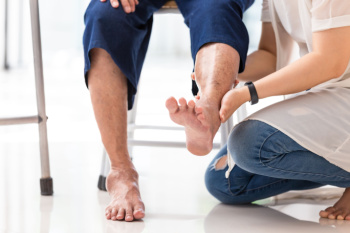
Charcot-Marie-Tooth disease, or CMT, is a genetic condition that primarily impacts the peripheral nerves, which connect the brain and spinal cord to the rest of the body. This condition often begins to affect the feet and lower legs first, with symptoms typically starting between the ages of 5 and 15. People with Charcot-Marie-Tooth disease may experience high-arched feet, flat feet, hammertoes, muscle weakness in the lower legs, foot drop, and a distinctive high-stepping gait to avoid tripping. Over time, these issues can lead to muscle wasting in the legs, which creates challenges with walking and balance. A podiatrist plays a key role in managing the symptoms of this incurable condition by providing specialized care for foot deformities and gait issues. This may include custom orthotics to support the feet, recommendations for proper footwear, or bracing to improve stability and mobility. Such interventions can enhance a person’s quality of life and reduce discomfort associated with CMT. If you believe you have symptoms of Charcot-Marie-Tooth disease, it is suggested that you schedule an appointment with a podiatrist to help manage this condition.
Neuropathy
Neuropathy can be a potentially serious condition, especially if it is left undiagnosed. If you have any concerns that you may be experiencing nerve loss in your feet, consult with Sarah Urton, DPM from Kitsilano Foot and Ankle Clinic. Our doctor will assess your condition and provide you with quality foot and ankle treatment for neuropathy.
What Is Neuropathy?
Neuropathy is a condition that leads to damage to the nerves in the body. Peripheral neuropathy, or neuropathy that affects your peripheral nervous system, usually occurs in the feet. Neuropathy can be triggered by a number of different causes. Such causes include diabetes, infections, cancers, disorders, and toxic substances.
Symptoms of Neuropathy Include:
- Numbness
- Sensation loss
- Prickling and tingling sensations
- Throbbing, freezing, burning pains
- Muscle weakness
Those with diabetes are at serious risk due to being unable to feel an ulcer on their feet. Diabetics usually also suffer from poor blood circulation. This can lead to the wound not healing, infections occurring, and the limb may have to be amputated.
Treatment
To treat neuropathy in the foot, podiatrists will first diagnose the cause of the neuropathy. Figuring out the underlying cause of the neuropathy will allow the podiatrist to prescribe the best treatment, whether it be caused by diabetes, toxic substance exposure, infection, etc. If the nerve has not died, then it’s possible that sensation may be able to return to the foot.
Pain medication may be issued for pain. Electrical nerve stimulation can be used to stimulate nerves. If the neuropathy is caused from pressure on the nerves, then surgery may be necessary.
If you have any questions, please feel free to contact our office located in Vancouver, BC . We offer the newest diagnostic and treatment technologies for all your foot care needs.
